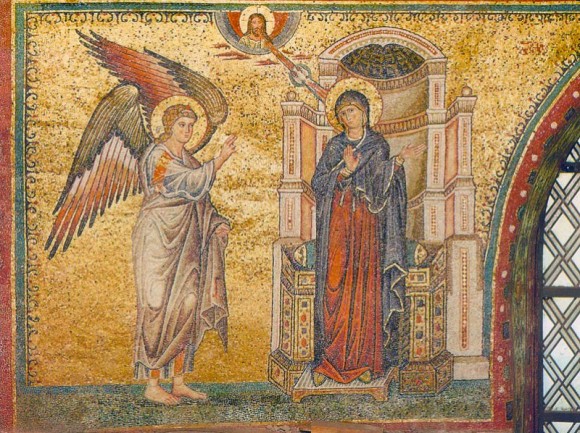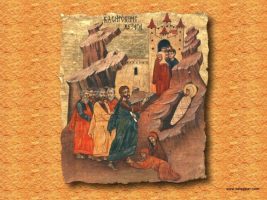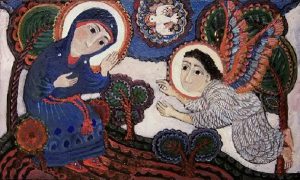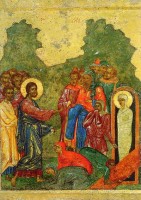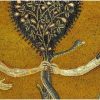If this were to happen now, it is unlikely that the Orthodox people would be seized by panic. They would look on the Internet, discuss it on forums, and calm down. But then, way back in 1991, a feast of joy multiplied by two created panic and fear among the majority. And how! Pascha fell on the same day as the Annunciation!
This had not happened within the memory of even the most ancient of old ladies just barely able to make it to church. Rumors spread about the end of the world and the first self-published leaflets (which later turned into newspapers and continued to frighten parishioners) poured oil onto the fire. In short, the anticipation of the feast days evoked horror rather than joy.
The Kyriopascha of 1991 likely became the starting point of the mass apocalyptic mood. [1] To a certain extent, this mood continues to serve as the dominant religious consciousness of a portion of the faithful. Although, of course, this mass hysteria has gradually died down.
The last powerful outburst came, I think, in 2000. I remember how one young monk told me in absolute earnestness that he would definitely try to get ordained in 1999, because an ordination in the third millennium would be invalid. And indeed he was ordained – after begging the bishop on his knees.
Vladyka’s heart was not made of stone, so he surrendered under the pressure of monastic zeal. What else was there to do? Sooner or later the monk would have to be ordained anyway. What else could one do with a tonsured, well-known spiritual father living in a parish but not cut out for monastery life?
This monk managed to receive a “correct” ordination, but it did him little good. He wandered from parish to parish without finding a place for himself, changing dioceses several times. He never settled, ultimately returning to his native Ukraine, although without seeking to join a diocese. He now lives in the midst of small groups of equally exalted followers, venerating “little old elders” and “holy trinkets” while distributing discs against the VAT and about Slavik of Cherbarkul. [2]
It seems to me that our sin consists in seeing something harmful in feast days and signs. We see something bad in every sign: in Kyriopascha, we see the end of the world; in the comet of 1997, we see tragedy; and in myrrh-streaming icons, we see the tears of saints before a disaster.
If the Holy Virgin were like us, she would not have listened to the Archangel. She would have immediately said to him: “I know, I know – troubles and misfortunes are awaiting us.”
But the Ever-Virgin was different. She humbly listened to the Archangel’s good tidings and obediently took upon herself a burden that was beyond the capacity of a young woman. She trusted that He Who chose her for this special service would also give her the strength to bear it.
Therefore, the Feast of the Annunciation is not just about the joy of “the crown of our salvation,” but also a lesson to us all about how to trust in God. After all, He alone knows what is good for us. And if this is the case, then we should be filled with trust in Him.
The Lord leads us along a path that is difficult and challenging, but salvific. All other paths lead us to perdition. Let us, then, repeat this with the All-Pure One today: “Behold, we are Thy servants, O Lord, be it unto us according to Thy word.”
This year the Annunciation coincides with Lazarus Saturday. On one and the same day we celebrate both the beginning of the Savior’s earthly path and its completion. The Lord finished His earthly mission with the raising of Lazarus. Tomorrow He will enter Jerusalem, going on to His voluntary suffering for our salvation. This is an altogether different part of His earthly life, inseparably bound up with the Cross and our deliverance from the bondage of eternal death.
For now, the Lord simply returns a disciple to his earthly life. He returns him so that Lazarus could serve the Lord by becoming a bishop. It is the same with each of us among the faithful: the Lord raises us from eternal death for the sake of serving Him.
Thus, let us serve the Lord with the zeal of the saints, because the only service pleasing to God is that which is accompanied by limitless trust in the Lord and that is the most important thing in our lives!
Translated from the Russian.
Translator’s notes:
[1] Kyriopascha (“the Lord’s Pascha” in Greek) refers to the celebration of the Annunciation (which is a fixed feast) and Pascha (the date of which varies from year to year) on the same day. In the twentieth century it occurred only twice: in 1912 and 1991.
[2] All examples of a particular type of misguided piety. Starichki (“little old elders”) and sviatyn’ki (“holy trinkets”) are diminutive and rather saccharine names for pious old men and various minor holy objects, respectively. The VAT is the value added tax identification number, which some see as the mark of the beast. Both the Orthodox Church of Greece (in 1998) and the Russian Orthodox Church (in 2001), however, have stated that Orthodox citizens may use it. Slavik of Cherbarkul (Viacheslav Sergeevich Krasheninnikov, 1982-1993), a boy who died at the age of ten, is considered by some a wonder-worker and prophet. The Russian Orthodox Church, however, has condemned his cult of veneration.













